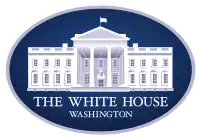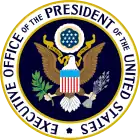United States Domestic Policy Council
The Domestic Policy Council (DPC) of the United States is the principal forum used by the President of the United States for considering domestic policy matters, excluding economic matters, which are the domain of the National Economic Council. The council forms part of the Office of White House Policy, which contains the DPC, the National Economic Council, and various subordinate offices, such as the Office of National AIDS Policy. The Director of the DPC is titled the Assistant to the President and Director of the Domestic Policy Council.
 | |
| Agency overview | |
|---|---|
| Formed | 1985 |
| Headquarters | Eisenhower Executive Office Building |
| Employees | 25 |
| Agency executive |
|
| Parent agency | Office of White House Policy |
| Website | Domestic Policy Council |
History and mission
The Domestic Policy Council was established on April 11, 1985, by President Ronald Reagan.[1] The first Executive Director of the Council was Ralph Bledsoe.[2] President George H.W. Bush re-established the Council on February 8, 1989, appointing Kenneth Yale as Executive Director of the Council.[3] On August 16, 1993, the Council was expanded by Executive Order 12859. The Council oversees development and implementation of the President’s domestic policy agenda and ensures coordination and communication among the heads of relevant Federal offices and agencies.
Even before the formal creation of the DPC, some form of a domestic policy staff had existed in the White House since the 1960s. President Lyndon B. Johnson assigned a senior-level aide to organize staff and develop domestic policy. In 1970, President Richard Nixon issued an executive order that created the Office of Policy Development, a large White House office with jurisdiction over economic and domestic policy. President Bill Clinton again altered the structure by splitting the office, forming the current Domestic Policy Council and the National Economic Council which both exist today underneath the umbrella of the Office of White House Policy, which can also be known as the Office of Policy Development.[4][5]
Assistants to the President for Domestic Policy
| Officeholder | Term start | Term end | President |
|---|---|---|---|
| Pat Moynihan Urban Affairs |
January 23, 1969 | November 4, 1969 | Richard Nixon |
| John Ehrlichman | November 4, 1969 | April 30, 1973 | |
| Melvin Laird | May 1, 1973 | January 8, 1974 | |
| Kenneth Reese Cole Jr. | January 8, 1974 | February 28, 1975 | |
| Gerald Ford | |||
| James Cannon | February 28, 1975 | January 20, 1977 | |
| Stu Eizenstat | January 20, 1977 | January 20, 1981 | Jimmy Carter |
| Vacant | January 20, 1981 | June 20, 1985 | Ronald Reagan |
| Ralph Bledsoe | June 20, 1985 | March 30, 1987 | |
| Ken Cribb | March 30, 1987 | December 2, 1987 | |
| David McIntosh | December 2, 1987 | September 8, 1988 | |
| Dan Crippen | September 8, 1988 | January 20, 1989 | |
| Roger Porter | January 20, 1989 | January 20, 1993 | George H. W. Bush |
| Carol Rasco | January 20, 1993 | December 20, 1996 | Bill Clinton |
| Bruce Reed | December 20, 1996 | January 20, 2001 | |
| John Bridgeland | January 20, 2001 | January 30, 2002 | George W. Bush |
| Margaret Spellings | January 30, 2002 | January 5, 2005 | |
| Claude Allen | January 5, 2005 | February 9, 2006 | |
| Karl Zinsmeister | May 24, 2006 | January 20, 2009 | |
| Melody Barnes | January 20, 2009 | January 2, 2012 | Barack Obama |
| Cecilia Muñoz | January 10, 2012 | January 20, 2017 | |
| Andrew Bremberg | January 20, 2017 | February 2, 2019 | Donald Trump |
| Joe Grogan | February 2, 2019 | May 24, 2020 | |
| Brooke Rollins Acting |
May 24, 2020 | January 20, 2021 | |
| Susan Rice | January 20, 2021 | Incumbent | Joe Biden |
References
- "Fact Sheet". digitalcollections.library.cmu.edu. April 11, 1985. Retrieved 2020-03-21.
- "Bush's Team: The First Choices". January 23, 1989 – via NYTimes.com.
- "Domestic Policy Council". White House Administration. White House. Archived from the original on 2010-02-26. Retrieved 2010-02-26.
- "Domestic Policy Council". US Government Manual. Government Printing Office. 2012-12-07. Retrieved 2013-08-30.
